Margaret Atwood spends most of The Handmaid’s Tale wrapping the reader in the multilayered traumas of Gilead, as heavy and stifling as the gowns and blinders that the Handmaids wear. Then, near the end of the book, she whips it all away—figuratively and literally—with a visit to Jezebel’s. Offred has spent the entire book pushing against the constraints of how intelligent, how sexualized, how free a woman in Gilead is allowed to be, only to discover a whole other route of survival for certain women, in the form of the men of Gilead’s guilty pleasure. It’s a fleeting yet vital sequence whose main purpose is to scare Offred out of complacency, but the setting is rich with story potential. But even as the TV series has been building out the smallest moments in the book, the decision not to spend more time at Jezebel’s than what’s in the source material was a narrative misstep.
Spoilers for The Handmaid’s Tale 1×08 “Jezebels”
And by that I mean… Moira’s alive! But we only get as much time with her as is in the novel. It’s by chance that she and June cross paths, when the Commander decides to take his Handmaid out on the town. Because of course illicit Scrabble games and magazines aren’t enough to satisfy his desire to bend Gilead’s rules. It’s also an escalation of his control over Offred; after requesting (but not really requesting) that she sneak into his office at night and demanding that she kiss him “like she means it,” now he’s literally telling her what to wear (a glitzy dress and heels) and how to look (he creepily watches her apply makeup in the mirror he holds up). But this time his whims could get her killed, if she were discovered.
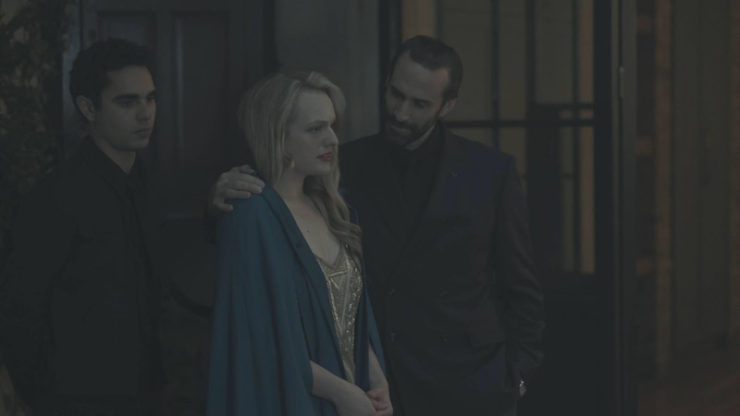
This is new to Offred, but it’s by no means new to the Commander, nor to Nick. That’s why they have it down to a science how to get her out of the house (Serena Joy is visiting her mother overnight), through the compound (she hides her face behind one of Mrs. Waterford’s cloaks), and into what used to be Boston (she has to hunch down in the Commander’s lap, because no women are allowed past this point). That’s why the folks at Jezebel’s recognize him and don’t bat an eye at his special guest. That’s why Nick has his own business to conduct while the Commander draws Offred through the looking glass into this otherworld that, despite the song cue, is not Wonderland.
Visually, at least, Jezebel’s is the complete opposite end of the spectrum from being a Handmaid: The women are dressed provocatively, baring their skin and hair and faces. We even get the return of the sexy Handmaid outfit! The Jezebels get to look into men’s eyes instead of at the ground; they drink and smoke and laugh and talk. Their former lives—as CEOs, journalists, sociology professors, or, yes, sex workers—are acknowledged and even occasionally engaged with, if the men commanding their time have a yen for conversation. Of course, these are all things that the men would tell themselves as justification for the existence of Jezebel’s. Because it’s still a brothel, and any supposed freedoms these women possess are moot because it’s just another rung in Gilead’s hierarchy.
But Moira is here, and that makes June’s risks worth it. Samira Wiley and Elisabeth Moss act the hell out of their reunion, holding each other in the opulent ladies’ room and shaking with horror and hysterics at where fate has brought each of them. The fact that Moira’s first words are apologizing for leaving June at the train station made my heart twist, the guilt and fear that she’s carried for years. But of course they pick up right where they left off, and they’re both just so relieved to see that the other has survived.
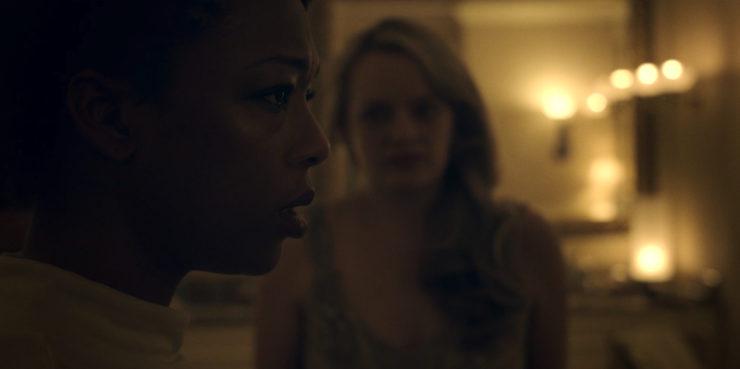
And then, even in this sacred, women-only space, they get interrupted by an Aunt enforcing the rules: Moira has already been to the bathroom, she has to go back out on the floor. They conspire to meet up in the women’s dorms later that night; in the meantime, June must return to the Commander.
It’s a jarring interruption that made me ache to fast-forward until I could get back to the reunited friends, so in that way it was an effective move. Unfortunately, it also hammered home the point that this entire episode felt filtered through the male gaze. Figuratively, we get the “male gaze” as Moira and June are dressed in ways fulfilling men’s fantasies, expected to perform as if they’re taking as much enjoyment out of scenario as the Commanders. The episode also literally revolves around a male perspective, through flashbacks of Nick’s life pre-Gilead. As the show’s writers expanded Ofglen/Emily’s fate, Serena Joy’s hand in building Gilead, and Luke’s surprise survival, they have given new dimensions to one of the novel’s least explored characters. And Nick’s new backstory resonates both within the world of the series and our reality: After losing his job at a steel factory, he struggles to find employment. When he gets into a fight at the unemployment office and the recruiter, rather than sue him, takes him out for coffee, of course Nick listens. And when this man says that he’s part of a secret group that “wants to set things right, clean up this country” and that there could be a job in it for Nick, of course Nick says yes.
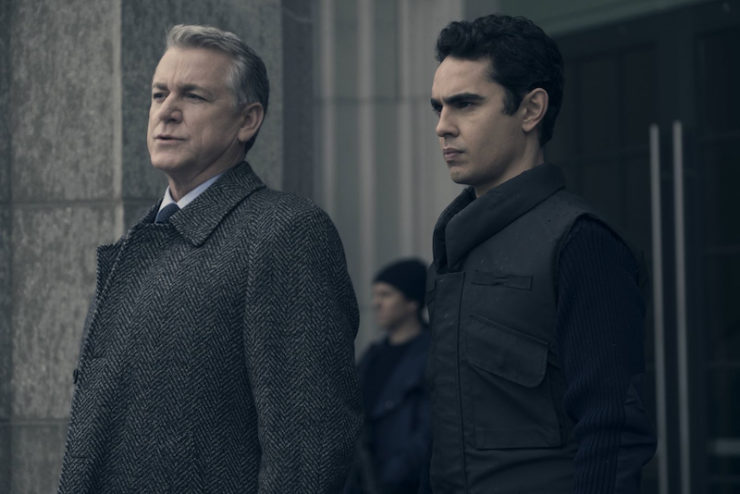
Book Nick is pretty inscrutable, so I appreciated this shading of his character. He’s a young man who doesn’t see a future with jobs for him, so he agrees to put his head down and help create a new world order with his place secured. What he doesn’t realize is how easily he’s been suckered, how the architects of Gilead will take advantage of his idealism to use his labor—as a driver, as a bodyguard, as a spy—just as they’ve used Serena Joy’s ideas without actually granting her any agency or real stake in Gilead. Even after the wool is taken from his eyes, when Waterford’s whims lead the former Offred to hang herself, he doesn’t leave. Where would he go? What could he do?
In fact, the smart thing for the recruiter, now called Commander Price, to do is to give Nick another responsibility: He’s an Eye, stationed at the Waterford home to spy on his Commander. The men who created Gilead aren’t stupid; they know that even they, at the top of the pecking order, need a system of checks and balances. Or, as Price puts it, sometimes they need to be saved from themselves.
One of the best moments in this episode’s flashbacks was Serena Joy’s furious, hissed “What did you think was going to happen?” to her husband as the black van took away Offred’s corpse. She must have some inkling of the Commander’s dalliances, then. And yet, he doesn’t learn. He watches the next Offred and starts the cycle—the Scrabble tiles, the magazines, the kiss, the shaving of the legs—all over again.
All pretty fascinating, right? But it didn’t need to be in “Jezebels.” Yes, the Commanders spying on and protecting one another is thematically linked to the same kind of let’s-both-look-the-other-way foundation that keeps the lights on at a place like Jezebel’s. But choosing that backstory to support the present action is tantamount to the moment when Offred asks who everyone in this hotel is and the Commander blithely proceeds to identify all of the male clients, only for her to stare at him and say, “I was talking about the women.” Why not spend this entire episode at Jezebel’s? Delve into the history of the place—how they wound up at this hotel, whether the Aunts are stand-ins for madams or if men run the place, follow different Jezebels through a typical night’s work. The brief glimpse of one working girl staring blankly ahead while a client licked the stump of her arm was chilling. Hell, I’d follow the chef-turned-contraband-dealing Martha, in charge of trading booze and hair dye to Nick in exchange for prescription drugs and pregnancy tests, for her own episode.
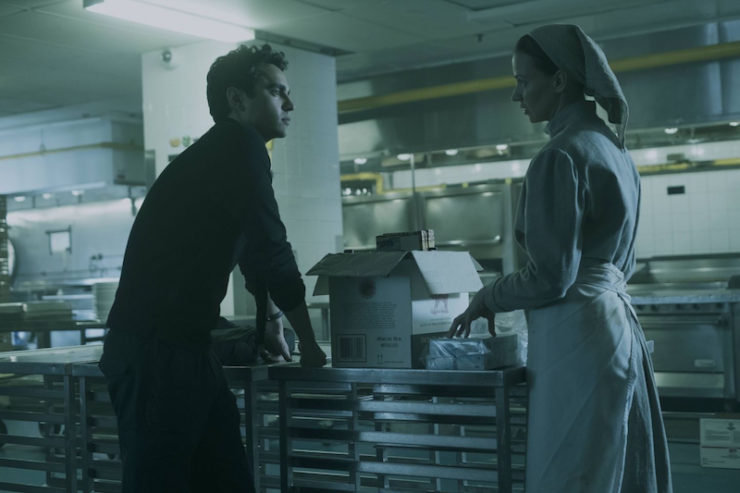
Why not follow Moira from the moment she stepped on that train, to the Underground Femaleroad, to the moment of betrayal that dragged her back to Gilead and presented her with the impossible choice of work in the Colonies until she died of radiation exposure or work at Jezebel’s until she was physically and emotionally used up? If we got an entire episode of Luke stumbling his way into Canada, then it would stand to reason that we get an episode filling in the blanks of Moira’s adventures. Instead, we get only as much material as is in the book: After submitting to another rape by the Commander, June finds Moira in the dorms for their catch-up. It’s only a few minutes, as Moira explains the above and tries to make light of her situation. Again, Wiley gives such a wrenching depiction of being beaten down, of being unable to recover any of her past fire or ingenuity because she can’t see beyond the tunnel vision of surviving until her inevitable end.
It’s so disturbing to see June and Moira’s positions reversed—the former talking about making a run for it, the latter defeated—and even more gutting as we didn’t get to see what brought Moira from point A to B. June’s reveal that Luke is alive means almost nothing; though Moira gamely shares in her friend’s excitement and gratitude that he made it out, she immediately follows it up with a sobering reminder that as women, they won’t be afforded the same opportunity for escape: “We’re alone, June. Just take care of yourself.”
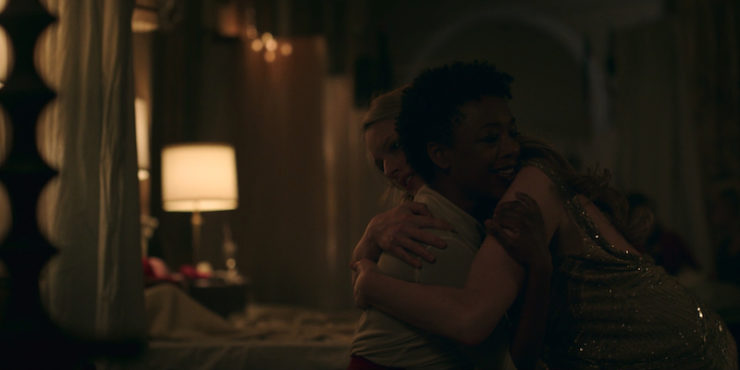
With The Handmaid’s Tale renewed for a second season, and considering that they cast Samira Wiley, I have to hope that Moira has a place in season 2. While this is the last we see of her in the book, it would be ridiculous to end her story here, when the series has expanded other key characters and laid the groundwork for them to ostensibly participate in the new upcoming storylines. I think we’ll get more Moira next season, but it’s still galling that we didn’t get more of her backstory in “Jezebels.”
Though the Jezebel’s interlude takes place at a different point in the series than in the book, it has the same effect: It shocks Offred into becoming more active in her own story. At the start of the episode, while in bed with Nick, she admits in her monologue that she’s not sleeping with him for any reason other than her own comfort:
I wish this story were different. I wish it showed me in a better light. In a different story, maybe I wouldn’t be such a fucking weakling. So, I’ve gone back to Nick. Time after time, on my own. I want to know him, memorize him, so I can live on the image later. I should have done that with Luke. Because he’s fading, day by day and night by night. He recedes, and I become more faithless. I could say these are acts of rebellion, a fuck you to the patriarchy. Those are excuses. I’m here because it feels good, and because I don’t want to be alone.
But by the end, she approaches her own narrative with a new perspective. Maybe it’s the galling gift from Serena Joy—who has returned, seemingly oblivious to what’s gone on in her absence—of her childhood music box complete with captive ballerina endlessly spinning for the gaze of whoever opens the box. Offred lets it play over and over, its sound masking the noise of her carving her own message alongside Nolite te bastardes carborundorum. Hers says You are not alone, but she’s not going to wait for the next Handmaid to find it:
If this is a story I’m telling, I must be telling it to someone. There’s always someone, even when there’s no one. I will not be that girl in the box.
Is this the moment that Offred decides to record her story? Up until now, her monologues have seemed more like in-the-moment thoughts and reactions than recollections and reconstructions aided by hindsight. Also, I noticed a blink-and-miss-it moment in last week’s episode: Luke remembering June playing with their daughter Hannah’s tape recorder—you know, one of those kid ones with the giant microphone and a brightly-colored cassette. If nothing else, it’s a great nod to the cassette tapes that make up The Handmaid’s Tale the cultural artifact, but I’m hoping it points to Offred getting her hands on a contraband recorder in the present. Maybe Nick can help.
Natalie Zutter was sure that there was going to be a certain Polaroid hidden in that music box. Share your Handmaid’s Tale theories with her on Twitter and Tumblr.










